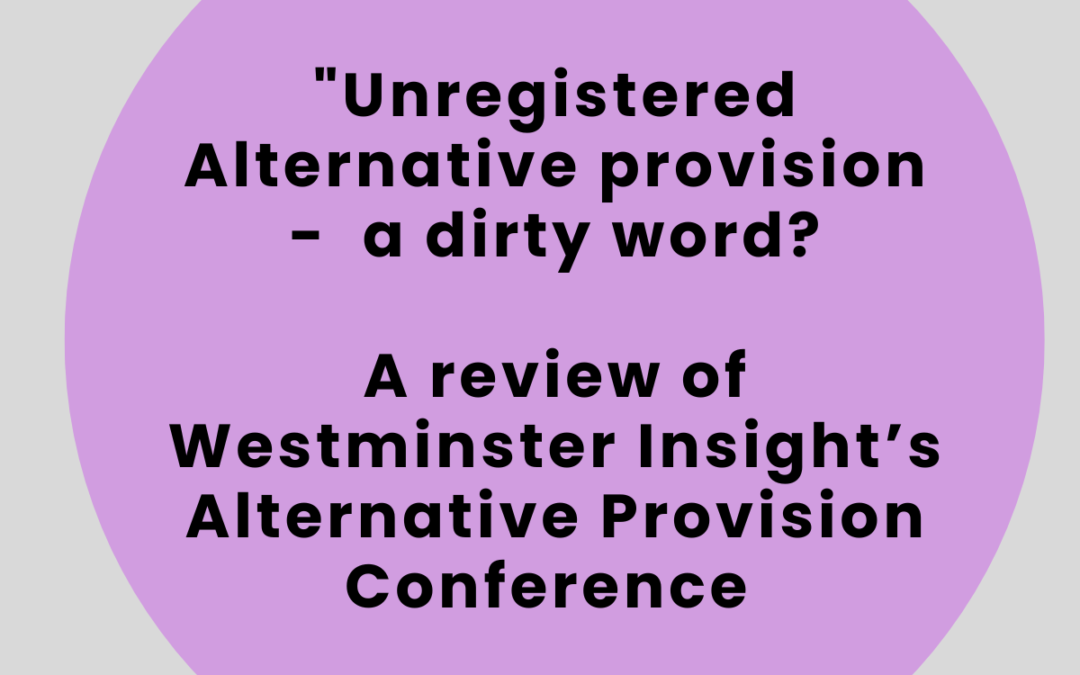“Unregistered” Provision, A Dirty Word?
Westminster Insight’s Alternative Provision Conference Review
On 27th November, ALIGN steering group members attended the 3rd annual Westminster Insights Alternative Provision Conference in London. The event featured speakers from a range of settings, including local authority representatives and experienced leaders from Pupil Referral Units and other registered alternative provision providers.
In part, the conference functioned as a clear response to the SEND & AP Improvement Plan published 20 months earlier. The content of discussions demonstrated the ways in which the Department for Education’s priorities (as set out in the plan) were beginning to filter down into the education landscape since being outlined in March 2023. Two key areas of focus included:
- The prioritisation of successful reintegration into mainstream and the need for AP to be time limited for all but the most complex pupils.
- An emphasis on the development of internal systems of alternative provision within mainstream schools.
Sarah Greaves, from Southend on Sea City Council, discussed an approach to alternative provision commissioning and support that aimed to swap “behaviour policies” for “relational practice policies” within the settings she works alongside. By focussing on short-term early intervention, she discussed how her team were able to increase successful reintegrations from AP to mainstream. The tiered system discussed by Greaves detailed the use of various levels of alternative provision either within the mainstream school or in partnership with local Pupil Referral Units and Independent Special Schools.
Amy Husband, from Academy 21, discussed the benefits of online alternative provision that is geared towards accessibility and greater mainstream inclusion. Her model emphasised the need for schools to appoint a senior person to manage relationships with AP providers to ensure a successful combination of provision types for pupils who face complex barriers to full inclusion. Husband discussed the benefits of Ofsted-registered online provision inspected under the new online schools accreditation scheme.
During the day’s first panel discussion, Neil Miller, Jeremy Dodd and Karen Thompson Powell explored the importance of belonging in AP. Transitions in and out of the provision were identified as key to ensuring a sense of belonging not only within the AP but within the broader community. Miler’s (London South East Academies Trust) insights were particularly useful here, because he provided some examples of transition programmes within his own setting. These highlighted the core issue around the differences between how mainstream and AP settings regard transition as a process and the conflicts that can be avoided.
In the second panel discussion of the day, partnership working between APs and schools was raised as a key method by which to drive improvements for pupils. According to Pani Matsangos (Westside School) this was dependent on clarity and honesty around what can be realistically achieved and should be a major part of the referral and transition process into AP. The concept of “sense making” and “voicing back” were raised by panel members as vital parts of the process for ensuring partnership working is effective with pupils, schools, AP and LAs.
Noticeably absent from any discussion at the event was the place of unregistered alternative settings in the complex patchwork of provision used by local authorities and schools. In fact, few contributors were keen to admit to using unregistered AP, despite the fact that it is widely relied upon to plug gaps in places and provision for many pupils. The ideological thrust of the Improvement Plan (geared as it is towards mainstream schools including pupils who might otherwise be excluded) has brought with it a renewed sense that use of unregistered alternative provisions is to be avoided.
Registered alternative provisions and mainstream schools are being encouraged to re-think inclusion, which can only be a good thing. Early intervention and an increased focus on relational practice could help stem the flow of pupils being excluded, and may also relieve the pressure on Pupil Referral Units and Independent Special Schools whose places are limited. Certainly, this event showed that work is being done to implement the changes outlined in the Improvement Plan and that schools and other providers are finding more joined up ways of working.
However, some acknowledgment of the importance and value of unregistered alternative provision should inform the thinking in this area. For some pupils, early intervention and reintegration plans wont work. For some it will be too late, for others their needs are too complex.
Acknowledging the vital role played by settings that don’t look and feel like “school” feels like a small thing to ask – they often work alongside schools and local authorities to support pupils in truly creative and flexible ways. I am sure that the exclusion of unregistered APs from the broader discussion of how best to support pupils was not intentional. It does however, point to a key question that unregistered APs need to tackle more proactively – why is “unregistered” such a dirty word and how can we change this?


I recently attended the latest Alternative Provision (AP) conference in Manchester and was concerned by the lack of representation from unregistered APs. The prevailing sentiment at the conference appeared to dismiss unregistered APs as, at best, a necessary evil, and at worst, dangerous.
I raised this issue with the organizers, Westminster Insight, and was directed to an email address for further comment. While several panel members seemed open to the concept of unregistered provision and acknowledged its role within the educational landscape, the overall tone of the conference suggested a negative view of unregistered APs.
Without a voice to counter these perspectives on the panels or during presentations, I believe the conference failed to provide a balanced view of the sector. Having read your previous article on a similar conference, I felt it important to share my observations on this recent event.